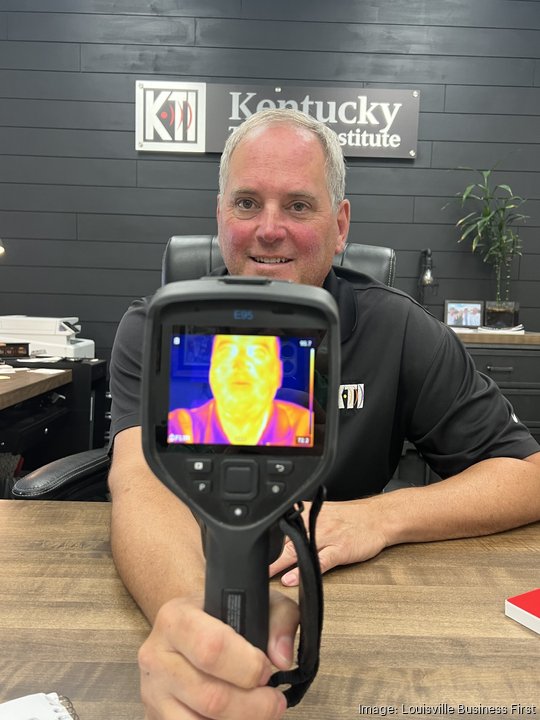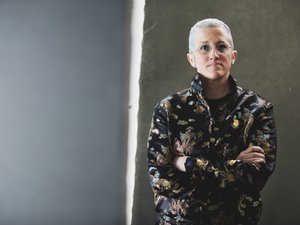
John Harnage enjoyed his position at what he called “a big corporate sales job." But the travel became too much for his family, especially when taking care of a son with tuberous sclerosis, a rare genetic disease.
“They literally gave him about four hours [to live], then four days. … He’s about to turn 30,” Harnage told me when I spoke with him at his office at the Western Kentucky University Innovation Campus in Bowling Green, Kentucky. “When I think I can’t, I think that 'He does.' I mean, he’s fought his whole life.”
To create a more flexible schedule to help tend to the needs of his son, Harnage started working as a home inspector in 2006 in Bowling Green — a town he has called home since arriving as a freshman at WKU in 1988. He stumbled across his first thermal camera in 2008 at a home inspection conference, where they showed how much heat escapes from a modern building using the handheld device — even if the building meets the efficiency standard.
“I saw the opportunity instantly,” said Harnage, who offers thermal imaging as an additional service to clients. “I became so intrigued with all of this. I couldn’t get enough of it.”
Seeing the overall theme of the flaws in homes in modern home building techniques, Harnage also felt a calling to spread the word to other people in the home inspection industry. He expanded his focus to include water intrusion and leaks, which expanded into teaching plumbers how to use the technology.
This educational and training component turned into the Kentucky Thermal Institute (KTI), which was established in 2008 and formed a partnership with WKU in 2020. Harnage eventually expanded his scope from residential buildings to the inspection of commercial facilities such as industrial plants, after realizing that thermal imaging also recovered electrical issues, water leakages and duct work issues.
His work on that front made Harnage realize the potential to establish a startup of the same name that would provide on-site industrial thermology services.
A shift in regulations influenced that initiative as well.
For years, thermal scans were recommended for commercial buildings, but they were not mandated. Now, that is changing.
When I spoke with him in July, Harnage showed me a copy of the electrical standards for Kentucky that last came out in 2010.
Now, according to the latest version of the National Electrical Code, the electrical systems of all commercial and industrial buildings must receive a thermal scan, in accordance with the National Fire Protection Association (NFPA)'s 70B standard. It came out in mid-April, Harnage said.
On the home front, these regulations will have a big impact on distilleries, given the high fire hazard that is associated with the facilities. At the time I spoke with him, a few distilleries had already been proactive by reaching out to not only an inspection but also educating their employees on thermal technology — and what to look out for.
KTI is also working on establishing a global standard for the electrical vehicle (EV) battery manufacturing industry for fixed mounted thermal cameras.
But there’s more. Aside from growing its industrial base, Harnage has another large vertical to climb: The medical field. That’s because he hopes to use the technology to form 3D thermal imaging on humans to help with sports-related injuries, first and foremost, to give more insight into the root of the injuries.
“After a football game … everybody comes in and does a starfish pose [to get scanned] ...” Harnage said. “The physical therapists will be able to see exactly where the body hurts. ... That’s going to be the next realm for us. I figure we're about two years out from getting involved in some strong medical research.”
As of a recent date, the KTI had not yet started to raise capital for the startup arm of its operation, but Harnage said that it has "some viable options ... to maintain our growth."









